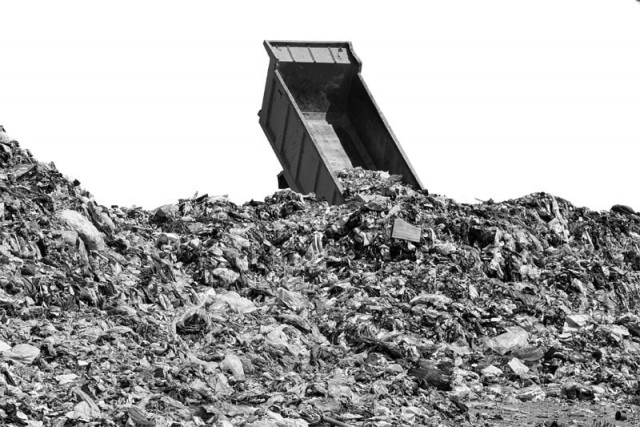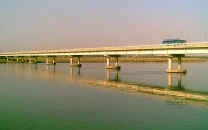Turning Islamabad’s trash into treasure
Capital’s unmanaged solid waste generation attracts authorities’ attention

The unmanaged solid waste generation of the rapidly populated federal capital has sought the attention of the authorities concerned to turn the trash into treasure through scientific management systems and recycling endeavours.
The capital inhabiting around 2.6 million people generates some 1,535 tonnes of solid waste per day whereas the civic agency is only able to manage 60-70% of it while leaving the rest to rot in open dumps, streets and empty places that is being burnt causing serious air pollution leading to smog and poor air quality in the scenic federal capital.
A study titled “Open Waste Burning and Its Health Hazards” by Desk Review claimed that solid waste mismanagement allowing open trash burning was seriously detrimental to human health and the environment at large as collectively injurious pollutants spewed into the atmosphere cast multidimensional consequences mainly complex health impacts on humans and biodiversity.
The open waste burning resulted in serious pulmonary complications and cardiovascular and carcinogenic ailments along with other chronic infections and allergies, putting children, the elderly, pregnant women, and individuals with prior conditions at risk.
It was putting wildlife, ecology, biodiversity and ecosystems equally at risk by degrading the quality of the biome in its habitats.
Sustainable Development Policy Institute (SDPI) Executive Director Dr Abid Qaiyum Suleri said globally waste management is not an issue but rather an opportunity that has been availed in the form of waste-to-energy projects not only in the advanced states but in developing countries across by transforming solid waste as a resource at par with the developed world.
“Pakistan is facing an energy crisis and it can venture into waste-to-energy opportunities to open another venue to ensure its energy security and resource management within one intervention,” he said.
The situation in the peri-urban and town areas across the country is unmanageable in terms of solid waste management whereas a strong local government system is imperative to address the issue as the local body system bears the responsibility after the municipal authorities for ensuring waste management, he added.
Dr Mansoor Ali from the Royal Academy of Engineering, UK said the peripheral waste burning in the federal capital and Rawalpindi’s vicinity is a very challenging issue.
The question is not the competence but the affordability of the most modern technology, making waste to energy as a resource a daunting task for the federal capital to embrace innovative ideas.
Dr Abida Shareef of FJWU leading an integrated solid waste management project has conducted a resourceful survey among 11,000 households through the door-to-door campaign in a rural area of Bhara Kahu in Islamabad.
The survey revealed hilarious facts as 52% of the survey respondents believed that household waste is not hazardous. Similarly, 53% of the respondents opined that garbage cannot be segregated whereas it is possible by imparting training to females at home. It proved the little knowledge of the community on waste management that needed to be improved through awareness and education.
She also noted that 58% of the respondents thought it was not illegal to burn waste, whereas 47% thought it was a smart way to burn and manage waste.
The survey found that females burning waste at the household level were few whereas the major problem was at the communal level at open dumping sites where communities and waste management officials were involved in setting up trash at the fire.
Interestingly, Aqsa Arshad, a Quaid-i-Azam University (QAU) student runs an in-campus compost facility making eco-organic fertilizer from organic waste. She said that the University campus in the vicinity of Margalla Hills National Park, embraces a plethora of vegetation throughout the year, whereas the plants and leaves were cut and burnt at the site or dumped into the nearby streams causing serious pollution.
Pakistan Environmental Protection Agency (Pak-EPA) Director Dr Zaigham Abbass believed that waste management was a matter of serious concern but focused research on the ambient pollutants impacts on sanitary workers is highly needed to study the effects they get due to direct exposure to open waste burning.
Another study on “Health-Driven Solutions: Transforming Waste to Protect Communities” by a Canadian think tank studied not only health impacts but also success stories of waste-to-resource initiatives providing a ray of hope for the countries facing crisis.
It mentioned that Sweden is leading waste-to-energy projects, transforming health and environmental snags into business opportunities. Sweden is converting 52% of its waste into energy incineration and only 1% of it ends up in landfill sites. The Scandinavian nation’s recycling revolution has turned waste into a profitable business, generating $100 million annually by importing and repurposing waste from nations like the United Kingdom, Norway, Ireland, and Italy.
In Singapore, the Integrated Waste Management Facility (IWMF) is becoming the largest energy recovery facility in the world and a flagship solution to specific problems caused by Singapore’s dense population.
The IWMF has the potential to treat over 2.5 million tons of solid waste annually, contributing to Singapore’s Zero Waste goals, given the country’s ambition to reach a 70% recycling rate by 2030.
Published in The Express Tribune, May 13th, 2024.


















COMMENTS
Comments are moderated and generally will be posted if they are on-topic and not abusive.
For more information, please see our Comments FAQ